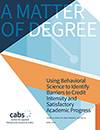A Matter of Degree
Using Behavioral Science to Identify Barriers to Credit Intensity and Satisfactory Academic Progress


Over 31 million Americans have earned college credits without earning their degrees. Higher education leaders, researchers, and policymakers are increasingly addressing this college completion crisis through a new lens: behavioral science. The interdisciplinary field of behavioral science focuses on how people make decisions and take action.
In 2017, MDRC teamed up with three community colleges in Minnesota to identify some of the behavioral reasons for the low rates of college completion among their students. Colleges in the study are part of the Minnesota State Colleges and Universities system, which is the largest college system in the state, and the fourth largest system in the country. The project, titled Finish Line: Graduation by Design, used a behavioral science framework developed by MDRC’s Center for Applied Behavioral Science (CABS) to explore the following two postsecondary domains that are closely linked to college completion rates, and identified key barriers to their attainment.
Credit Intensity: The number of credits that students attempt and complete each semester.
Barriers to Increasing Credit Intensity:
-
Institutional and social norms may not support higher credit loads
-
Students may continue to take the lighter credit loads proposed for their first semester
-
Students might not understand how part-time attendance impacts their time-to-degree
-
Lighter credit loads fulfill short-term needs at the cost of long-term goals
- Complex cost and financial aid variables may not factor into credit intensity decisions
Satisfactory Academic Progress (SAP): Academic standards that determine enrollment and financial aid eligibility.
Barriers to Satisfactory Academic Progress:
-
Students may lack salient and timely information about SAP requirements
-
Lack of clarity about how withdrawing from a course could hamper academic progress
-
Students may ignore or be unaware of SAP violations
-
Cumulative SAP requirements could discourage students from appealing suspension
-
Sanctioned students may not receive proactive academic and personal support
MDRC used a problem-solving plan developed by MDRC’s Center for Applied Behavioral Science called the CABS Approach to uncover these hidden behavioral and institutional barriers to credit intensity and SAP. This report details these findings and offers recommendations to colleges seeking to help their students overcome obstacles to graduation.






